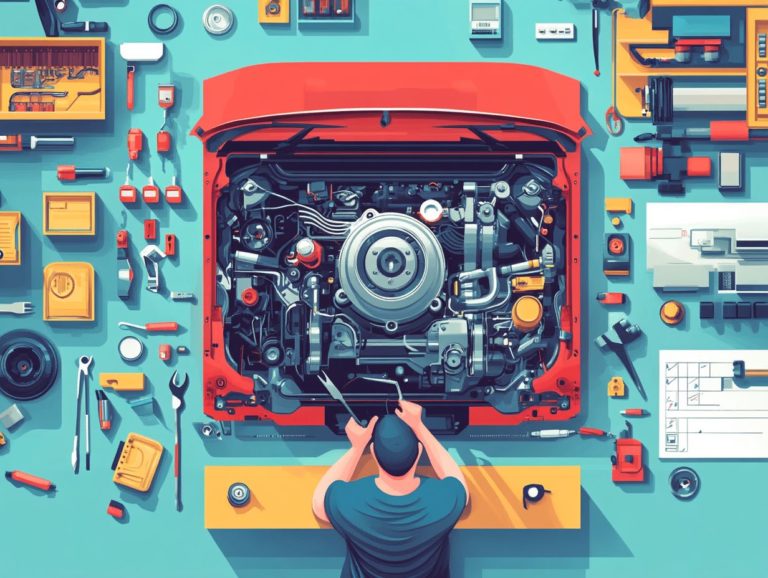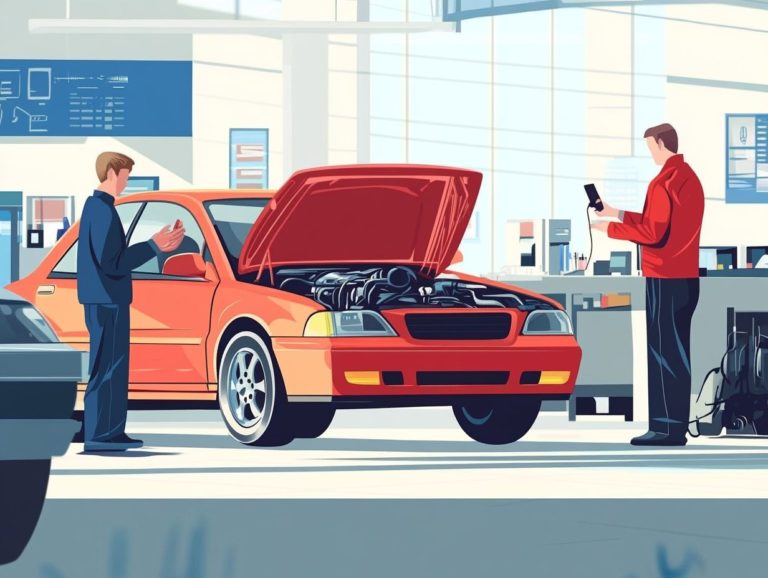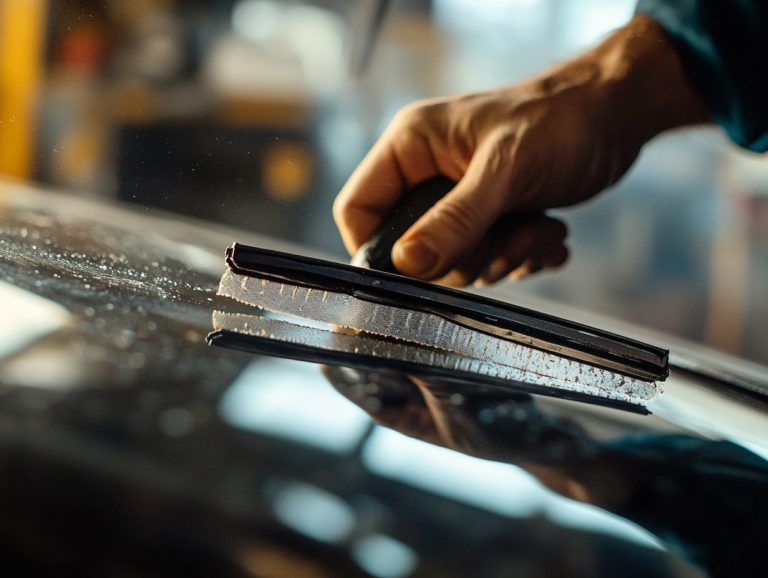Essential Car Maintenance: A Complete Guide
Maintaining your car is essential for its longevity and performance. Regular upkeep enhances safety and saves you money by preventing costly repairs.
This guide covers the fundamental car maintenance tasks to prioritize, such as:
- Oil changes
- Tire rotations
- Brake inspections
- Timing belt replacements
You’ll also find valuable tips for troubleshooting common issues. This knowledge helps you keep your vehicle in great shape.
Contents
- Key Takeaways:
- The Importance of Regular Maintenance
- Basic Car Maintenance Tasks
- Intermediate Car Maintenance Tasks
- Advanced Car Maintenance Tasks
- Troubleshooting Common Car Issues
- Frequently Asked Questions
- What is essential car maintenance and why is it important?
- What are some common types of essential car maintenance?
- How often should I perform essential car maintenance?
- Can I perform essential car maintenance myself?
- What are the Consequences of Neglecting Car Maintenance?
- Is Car Maintenance Covered by a Warranty?
Key Takeaways:
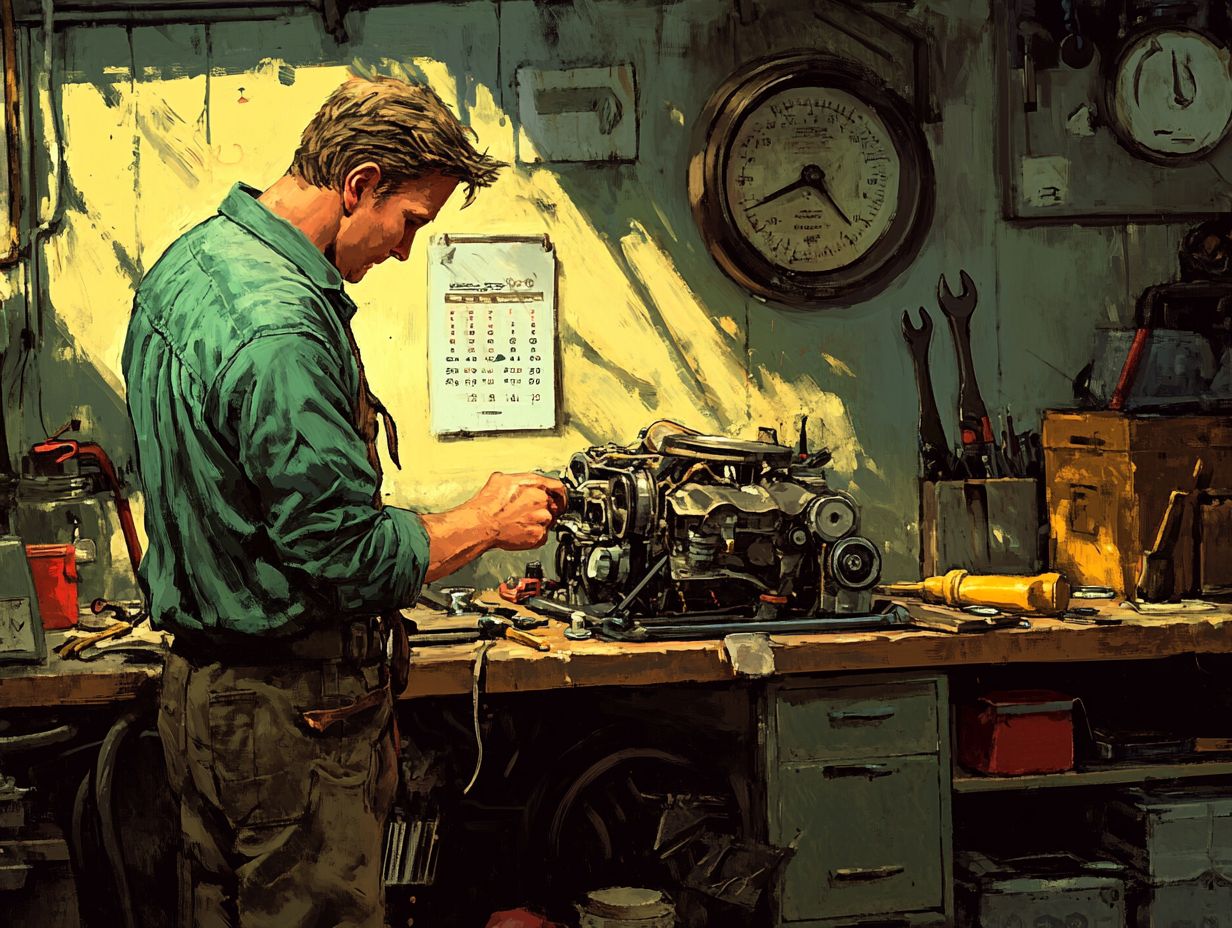
- Regular maintenance is crucial for keeping your car running smoothly.
- Basic tasks like oil changes and tire care should be done regularly.
- More complex tasks, like brake inspections, should be handled by professionals.
The Importance of Regular Maintenance
Regular maintenance is vital for your vehicle’s longevity and performance. It prevents small issues from turning into costly repairs.
It also boosts your driving safety by reducing risks. Following the schedule in your owner s manual helps you tackle crucial tasks like:
- Checking fluid levels
- Inspecting brake pads
- Monitoring tire tread
These tasks enhance your driving experience. Plus, they give you the peace of mind you deserve on the road.
Basic Car Maintenance Tasks
Basic maintenance is essential for keeping your vehicle in top condition. By prioritizing these tasks and referring to the ultimate car maintenance checklist, you ensure reliability and safety.
Oil Changes and Fluid Checks
Regular oil changes and fluid checks maintain your engine’s health. They reduce friction and prevent wear.
Align these tasks with your vehicle s maintenance schedule, usually every 3,000 to 7,500 miles. Fresh oil and proper fluid levels optimize function and enhance fuel efficiency.
Watch for signs like decreased fuel economy or odd noises; these could signal the need for a fluid check. By keeping up with maintenance, you can avoid costly repairs.
Tire Maintenance and Rotation
Keeping proper tire pressure and rotating your tires is crucial for safety and efficiency. Proper inflation reduces the risk of blowouts and improves handling.
Regular rotation helps distribute wear evenly, prolonging tire life and ensuring optimal traction.
Don’t overlook tire tread! Adequate tread depth is essential for grip on slippery surfaces, enhancing your vehicle’s performance. Together, these practices create a safer and more economical driving experience.
Battery Care and Replacement
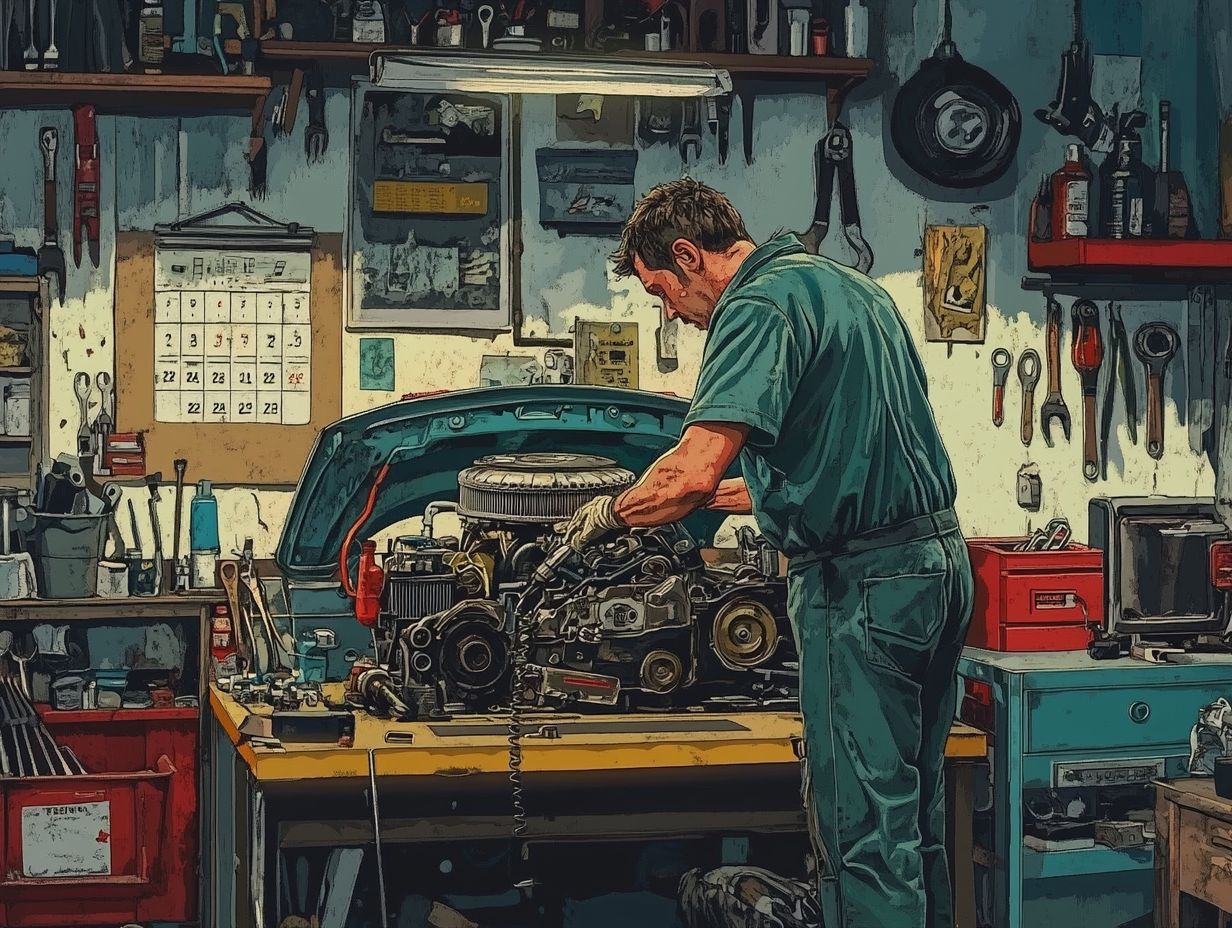
Proper battery care is essential for ensuring your vehicle operates reliably. A well-maintained battery is crucial for starting your engine and powering its electrical systems.
Regular mechanic checks can significantly extend your battery’s lifespan and help you avoid unexpected breakdowns. During these assessments, a trained technician will evaluate key indicators of battery health, such as voltage levels, corrosion on terminals, and the overall age of the battery.
Stay alert for signs that your battery may need replacing. Common indicators include difficulty starting the engine, dimming headlights, or a dashboard warning light.
By staying proactive with maintenance and recognizing these symptoms early, you can sidestep inconvenient situations and guarantee optimal performance from your car, enhancing both safety and efficiency on the road.
Intermediate Car Maintenance Tasks
Intermediate car maintenance tasks are vital for elevating your vehicle’s efficiency and performance. They serve as the crucial link between basic upkeep and more intricate repairs, ensuring your car operates at its best.
Brake Inspections and Replacements
Regular brake inspections and timely replacements of brake pads are essential for ensuring your vehicle’s safety and minimizing risks while driving.
These crucial tasks enhance your driving safety and contribute to your vehicle s overall performance and longevity. Be particularly attentive to signs indicating your brake pads may need replacement, such as squeaking or grinding noises, a spongy brake pedal, or vibrations during braking.
Incorporating brake checks into your car’s routine maintenance checklist can significantly reduce the chances of unexpected failures. Ensuring that your braking system receives professional evaluation and attention helps avoid more serious issues, safeguarding both your passengers and pedestrians on the road.
Spark Plug Changes
Changing spark plugs at the recommended maintenance intervals is essential for maintaining optimal engine performance and fuel efficiency.
These seemingly small yet vital components ignite the air-fuel mixture in your engine’s combustion chamber, ensuring everything runs smoothly. Over time, spark plugs can deteriorate, leading to misfiring, sluggish acceleration, and increased fuel consumption.
This decline in performance can diminish your driving experience and result in more serious engine problems if left unchecked.
To sidestep such issues, many experts recommend inspecting and replacing spark plugs every 30,000 to 100,000 miles, depending on your vehicle type and driving conditions. Following this guideline enhances your driving comfort and extends the life of your engine.
Air Filter Replacement
Regularly replacing your air filter is not just a routine chore; it s a crucial maintenance task that can dramatically enhance your engine’s performance and fuel economy.
A clean air filter ensures that only pure air flows into the engine, facilitating optimal combustion and seamless operation. When the filter gets clogged, airflow is restricted, leading to decreased engine efficiency and a noticeable dip in acceleration.
Look for signs that your air filter needs cleaning or replacement:
- A drop in fuel efficiency
- Odd engine noises
- Activation of the check engine light
Don’t forget to replace your air filter regularly for a smoother ride! Aim to replace it every 15,000 to 30,000 miles, though this can vary depending on your driving habits and conditions. Staying vigilant about the condition of your air filter can help you avoid costly repairs in the future, keeping your ride in tip-top shape.
Advanced Car Maintenance Tasks
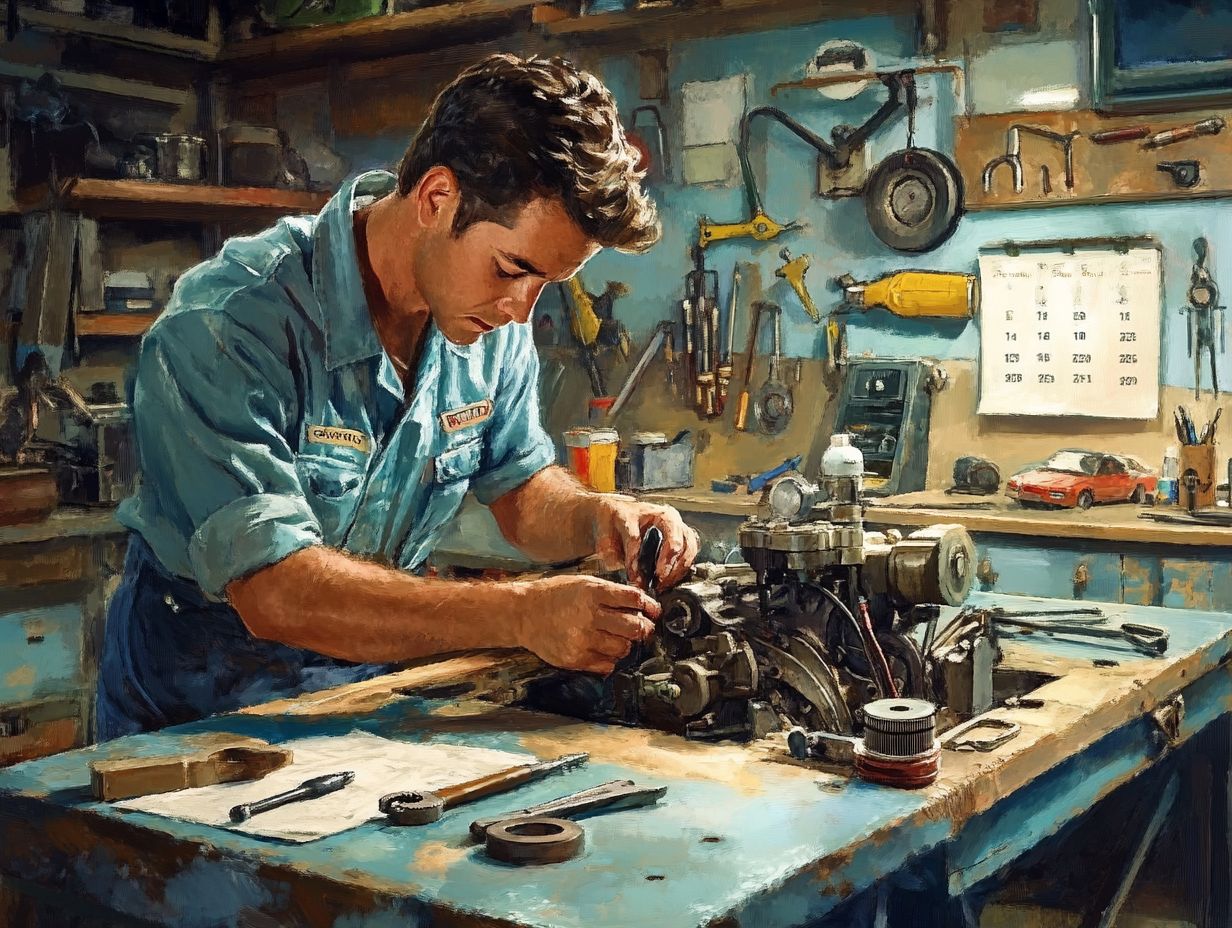
Advanced car maintenance tasks are essential for achieving optimal performance and safety, but beginners can start with simpler strategies. For those new to car care, following the top 10 car maintenance tips for beginners can provide valuable guidance, as these tasks often demand specialized knowledge and tools to execute effectively.
By mastering these skills, you can significantly enhance your vehicle s longevity and reliability.
Timing Belt Replacement
Replacing the timing belt on schedule is crucial. It prevents engine failure and keeps your engine running smoothly.
This important part helps the crankshaft and camshaft work together, allowing for precise timing of the engine’s valves. If neglected, a worn or broken timing belt can cause catastrophic engine damage, leading to costly repairs and frustrating downtime.
Experts recommend inspecting and replacing the timing belt every 60,000 to 100,000 miles, depending on your vehicle’s make and model. This proactive measure can help you avoid potential issues. By following these guidelines, you can maintain optimal engine performance and longevity, safeguarding your investment.
Suspension and Steering Maintenance
Regular maintenance of your suspension and steering components is essential for optimal vehicle handling. This ensures you enjoy a smooth and safe ride.
These critical elements work together to absorb shocks from the road, giving you precise control as you navigate turns and curves. Watch for signs of wear like uneven tire wear or a wandering steering wheel. These problems need quick action!
Neglecting routine checks on your steering and suspension can compromise your comfort and introduce safety risks. Deteriorated components may lead to decreased traction and longer stopping distances. By prioritizing these checks, you can enhance your vehicle’s longevity and improve your driving experience.
Troubleshooting Common Car Issues
Troubleshooting common car issues is a vital skill for every vehicle owner. By honing this ability, you can detect potential problems early and manage your maintenance tasks effectively.
Identifying and Addressing Problems
Identifying and addressing engine issues early can save you from costly repairs and ensure a safer driving experience.
Regularly inspect your engine components visually. Look for signs like fluid leaks, worn belts, or cracked hoses. Understanding warning lights on your dashboard is also critical; a check engine light could indicate anything from a loose gas cap to more serious problems. This knowledge empowers you to prioritize immediate action.
Regular mechanic inspections act as your safety net, catching potential issues before they escalate. Stay aware of how your vehicle performs. This way, you can protect your investment and contribute to a longer engine life.
Frequently Asked Questions
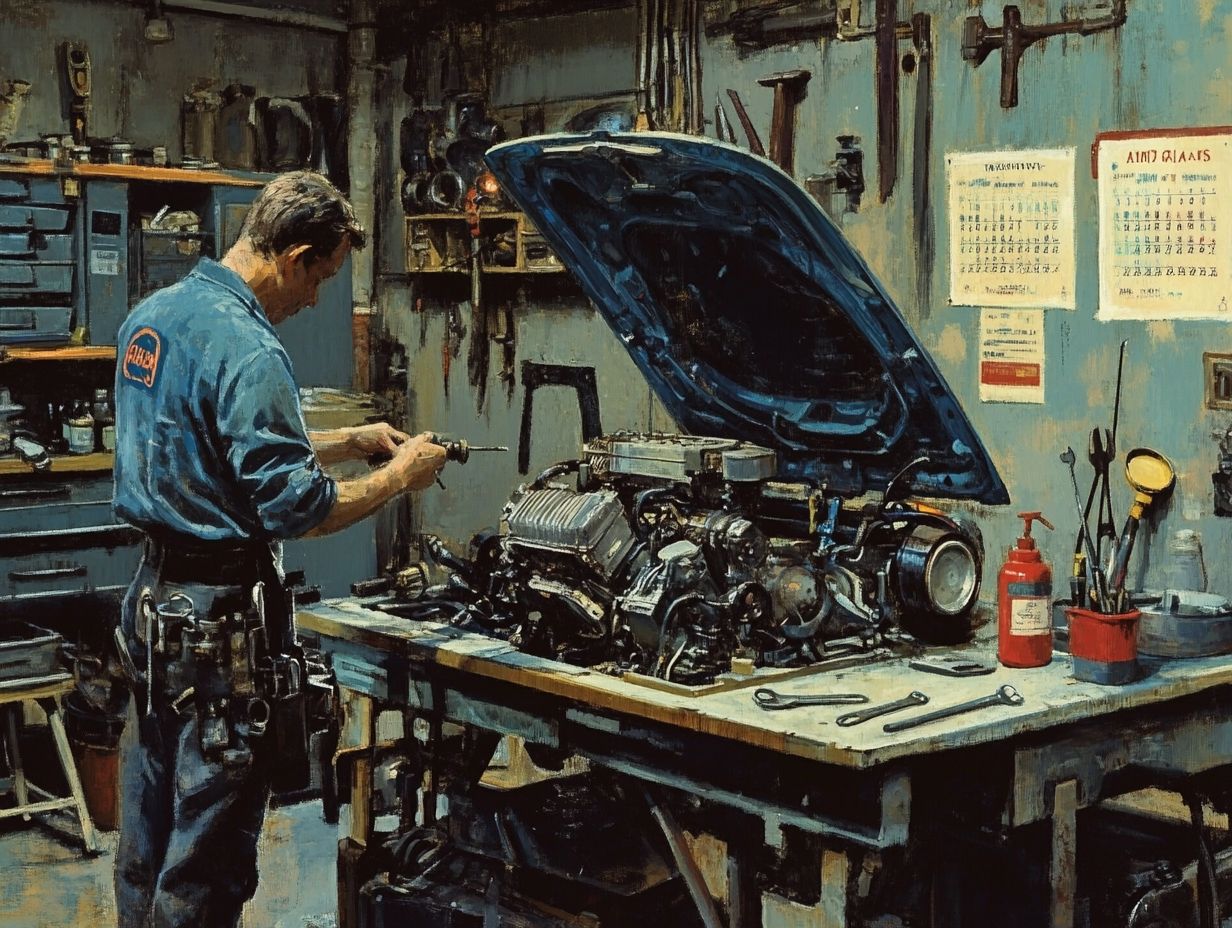
What is essential car maintenance and why is it important?
Essential car maintenance refers to the regular upkeep and repair of a vehicle to ensure its proper functioning. It’s important because it keeps your car safe, reliable, and in good condition. Understanding what every driver should know about maintenance can save you money and prevent breakdowns or accidents on the road.
What are some common types of essential car maintenance?
Common types of essential car maintenance include oil changes, tire rotations, brake inspections, fluid checks and replacements, air filter replacements, and regular tune-ups. For a comprehensive overview, refer to the ultimate guide to car maintenance schedules. These tasks help to keep your car running smoothly and prevent potential issues from arising.
How often should I perform essential car maintenance?
The frequency of essential car maintenance depends on factors like the age and mileage of your vehicle, driving conditions, and manufacturer’s recommendations. To stay on track, refer to the essential maintenance checklist for new cars and follow the maintenance schedule outlined in your car’s owner manual to ensure proper upkeep.
Can I perform essential car maintenance myself?
While some maintenance tasks can be done by the vehicle owner, it’s best to consult a professional mechanic for more complex jobs. DIY maintenance should only be attempted if you have the proper knowledge, skills, and tools. Improper maintenance can lead to more significant issues.
What are the Consequences of Neglecting Car Maintenance?
Neglecting car maintenance can lead to serious issues. Your car may suffer from poor performance, increased fuel costs, and a higher risk of breakdowns.
Regular upkeep prevents these problems and keeps your vehicle running smoothly.
Is Car Maintenance Covered by a Warranty?
New cars often come with a warranty that covers basic car upkeep for a limited time. Read the warranty terms carefully to know what’s included.
Even after the warranty expires, continue regular maintenance to protect your investment.


